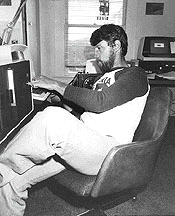June 30, 2025
Gary Kildall
Gary Kildall is regarded by some as the man who made the microcomputer readily accessible to non-expert users. His creation of CP/M, the first widely used operating system for the PC, eventually and controversially led to the DOS/Windows lineage of operating systems that most users are familiar with today.
Robert Cringely, in his book Accidental Empires, states that "Gates was a businessman from the start", he also says that Gary Kildall "invented the first microcomputer operating system because he was tired of driving to work". These two remarks are telling. Gates, no slouch as a programmer, is primarily a businessman. By contrast, Kildall was a brilliant and revered programmer who just happened to make not only a business but also, it must be said, several million dollars.
The microcomputer industry has always been an amalgam of the technical genius of people like Kildall and the ambition and acumen of those like Gates.
The CP/M episode is considered by many observers to form the basis of Microsoft's future success. Without its acquisition of QDOS (MS-DOS), and the subsequent porting of this operating system to the IBM-PC, Microsoft may well have remained peripheral. Kildall's claim that QDOS was CP/M plus a few minor deviations is generally unchallenged, except of course by Gates.

Gary Kildall
You can find a mugshot of Bill Gates, courtesy of the Albuquerque Police Department here.
A more than interested observer of this era is Gordon Eubanks, who worked for Kildall's Digital Research. Eubanks paints a picture of a man at odds with the tenets of corporate America. He quashes the notion that Kildall failed to land the IBM deal because he was too busy flying his plane, a tale that has become legend.
"The real issue wasn't that Gary refused to talk to IBM. The real issue was that Microsoft had a much better vision for the business. Gary was very laid-back. He did not care that much. And Bill was extremely focused and driven."
There is little doubt that Kildall enjoyed money, but his death in a Monterey bar-room brawl in 1994 left many observers to label him as the man who missed the chance to be Bill Gates. I believe this is wrong. There is a strong implication that Kildall missed out on something momentous, and yet his work led directly to the proliferation of the microcomputer. Any pique on his part was directed towards those who failed, or refused, to recognize his claim to the true authorship of what soon became the de facto operating system, MS DOS. Kildall never desired to build an empire, whereas Bill Gates always wanted Microsoft to be the biggest beast in the computing jungle.
Kildall's son, recalling his father's disillusionment with the industry, remembers him saying,
"...I learned that computers were built to make money, not minds."
Eubanks' final words on Kildall were
"Gary could have owned this business if he had made the right strategic decisions."
History may well decide that Eubanks was correct, but to dismiss Kildall's life as one of missed opportunity is to belittle the man's achievement.
⇑ Up to top of page